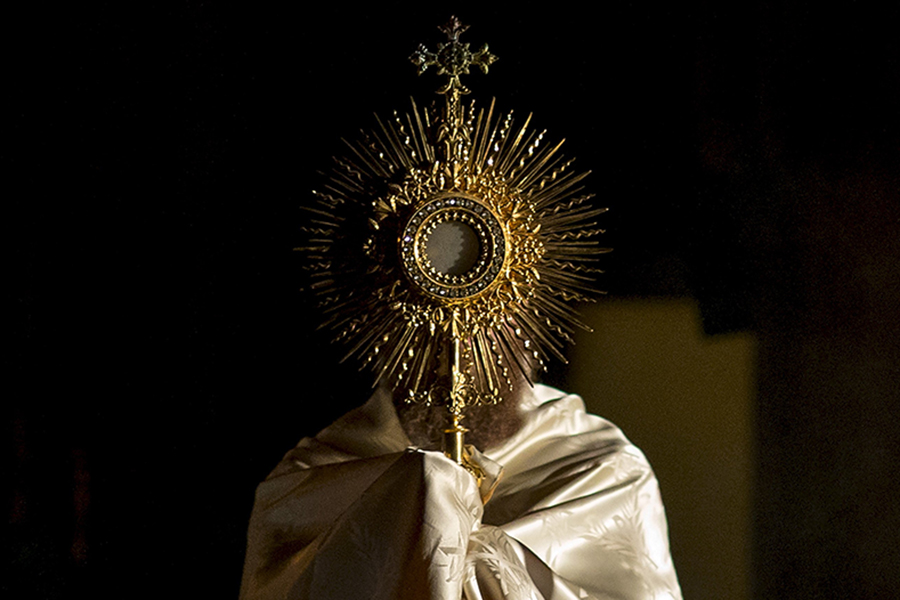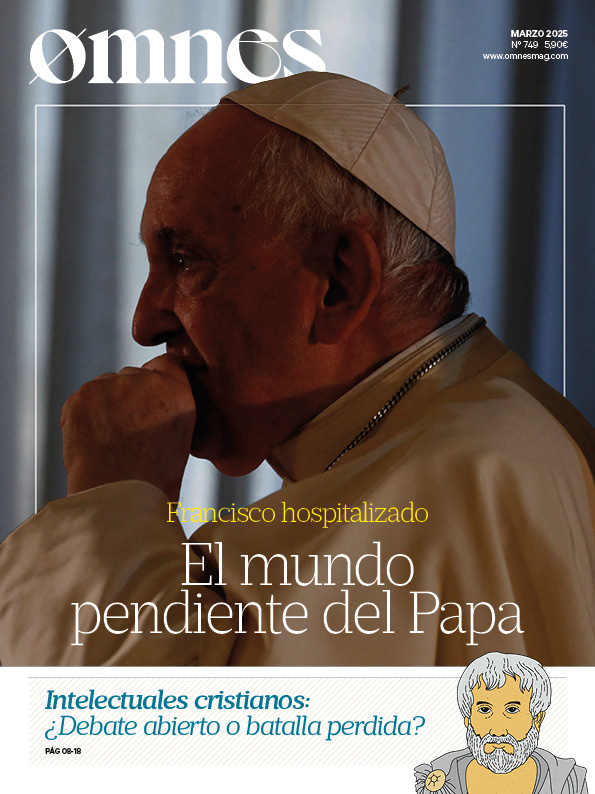Translation of the article into Italian
In this article we propose to reflect on Eucharistic Christocentrism, in continuity with the Christocentrism defended by authors such as Ratzinger, according to whom: "One does not begin to be a Christian by an ethical decision or a great idea, but by an encounter with an event, with a Person, which gives a new horizon to life and, with it, a decisive orientation" (Benedict XVI, Deus Caritas est, n. 1).
Briefly, we can say that Christocentrism is a vision in which Christianity is affirmed as a religion of encounter with a person rather than a religion of doing or acting. The primordial aspect of Christianity is the personal encounter in faith with the God who becomes man.
It cannot be said that this question is an absolute novelty, since the Eucharistic accent of the Christocentric approach goes in the same direction of what the Church has always taught. In this sense, it is not very original because the Church has insistently stressed the central value of the Eucharist.
However, at the present time it seems advisable to promote a new effort to facilitate a closer approach to Jesus Christ and, especially, in the Eucharist.
The starting point: a common occurrence
First of all, it should be pointed out that Eucharistic Christocentrism is not the fruit of a theoretical analysis. A purely reflexive vision of the question does not allow us to understand it in its true dimension. It is a common experience today that churches are empty in so many places, at least in some countries that are more economically developed and where there has been a strong Catholic tradition.
It is not a matter of looking at the decrease in the number of the faithful at Mass, a fact that is accompanied by the regular attendance of so many others who see Mass as the central act of their relationship with God, and which is in itself very positive.
The problem is not in the Mass but outside of it.
Unfortunately, it is a frequent experience that in churches, outside of liturgical celebrations, there is practically no one. This shortage of people has meant that churches are not very safe places and that, on occasions, it is better for them to be closed to avoid greater evils.
This fact should make us think because it could have important consequences.
If churches were only temples that preserve a series of objects for worship, or artistic objects, the emptiness of the churches would not have much relevance.
However, in the churches, in addition to all the objects that can be found there, they also guard the presence of Christ in the Eucharist.
The Eucharist is not just another thing inside a temple as a statue or a painting could be. The Eucharist is the center of the temple and its cause. There are temples to celebrate the Eucharist and for the Eucharist to be reserved for the worship of men.
Personal encounter with the Eucharist
When Christ set foot on earth some two thousand years ago, He asked people to listen to Him and to put their trust in Him. If Christ were to come to earth today as a man, as the man who inhabited a part of this world, we would be obliged to go to meet Him.
That is to say, for those who have faith that Christ is God, his earthly presence should be an imperative call to see him in flesh and blood, with his gaze, with his words, gestures, etc.
Well, Christ is now physically present in the Eucharist, waiting for us with as much longing as when he lived on earth.
Christocentrism, therefore, affirms the need to encounter the Christ-God because it is that Person that defines the essence of religion.
Now, moreover, we add that the encounter with Christ-God must take place in the Eucharist, and not only in the celebration of the Mass.
In the Eucharist we have the certainty that He truly encounters His humanity and His divinity.
If Christ has remained in the Eucharist, it is because he wants to be with us. That is why we should not be indifferent when our churches are empty outside the liturgical acts; it is a sign that Christ-Eucharist does not have much value for us. Perhaps our faith has grown cold and we only believe, with effective faith, in the presence of Christ in the sacrifice of the Mass, but not in what is implied by his constant real presence in the Tabernacle.
Accompanying Jesus-Eucharist
It should be clarified that when we speak of accompanying Jesus in the Eucharist we are not referring to the need to have more acts of adoration, expositions with the Blessed Sacrament, etc., things that are very good, but that is not what this article is referring to.
Nor is the loneliness of the tabernacles solved by a few who are always in the churches so that they are never empty. The question does not go in that direction.
On the contrary, it is a question of the need for many to go to the tabernacles of their temples because it is Jesus who is waiting for them with unlimited patience. It can be said that the obligation belongs to the entire believing community. Those who think they are excluded from this duty already show that they have little faith in the Eucharist.
Christ has remained in the Eucharist so that we may come to Him. And what are we to do before the Eucharist? First, simply to be there; second, to speak to him and third, to listen to him.
Christ, who is a God of the living and not of the dead, is alive with the capacity to listen and to speak to us. Can we speak to Jesus everywhere? Of course, but we have to do it preferably where Jesus prefers, that is, where he has stayed.
It is clear that we can talk to a loved one on the phone, but it would not denote love if we prefer to talk on the phone rather than in his physical presence. For Christ prefers to speak with us face to face, physically.
And if we ask ourselves how many times should we be with Jesus-Eucharist, or how long should we be there? Here, logically, there is no fixed rule: it depends on family and social obligations, etc., which Jesus himself wants us to fulfill.
In any case, it is convenient to go to the Tabernacle on a daily basis. The time? Whatever God inspires each one and whatever his or her generosity gives. It is not necessary to spend many hours in front of Jesus in the Tabernacle. No, it is a matter of being many times (in many days), according to our circumstances and strength, with the purpose of having a dialogue with the Lord (in many cases, a few minutes are enough).
In the Eucharistic relationship there are two dimensions to take into account. The first is permanent and has to do with our personal relationship with Jesus. In this relationship it is essential to understand that Jesus wants to be with each one of us and does not care if we forget Him one day or the next.
The second dimension is temporal and is related to the massive abandonment of Jesus in the Eucharist. It should be an incentive for us to try to console Jesus in his solitude. And here, although our personal contribution may seem insignificant in the face of the indifference of so many, we should think that our treatment relieves him because Jesus does not desire the love of many, but the love of each one, beginning with our own.
Let us think that we Christians are rooted in the Church, usually through the parishes. Well, one task we could take on as believers is to see how we care for Jesus-Eucharist who is present in the tabernacle of our parish. Being with God the Eucharist is the best investment we can make of our time.
Although there has been talk of obligation or necessity, in this task of accompanying the Eucharist there is no other obligation than that of our love. It is love that is at stake, not the fulfillment of a duty.








